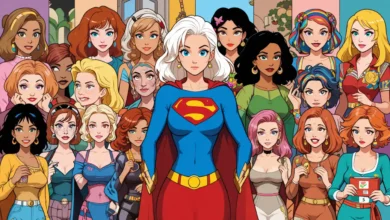Canon Events: A Comprehensive Guide to Their Importance in Storytelling

Introduction
In the realm of storytelling, whether it be in literature, film, or any other medium, “canon events” play a crucial role in shaping narratives. Canon events are the pivotal moments that define the trajectory of a story and its characters. These events are often deeply ingrained in the lore of the narrative universe, serving as anchor points that provide continuity and coherence. Understanding canon events can greatly enhance our appreciation of storytelling and the intricate craftsmanship behind it.
What are Canon Events?
Canon events are key moments or elements within a story that are considered official and authoritative. These events are part of the established lore and are recognized by both the creators and the audience as fundamental to the narrative. In the context of franchises with expansive universes, such as “Star Wars” or “Harry Potter,” canon events help maintain consistency across different media and adaptations.
The Role of Canon Events in Storytelling
Canon events serve multiple functions in storytelling. They provide structure, create continuity, and ensure that the narrative remains cohesive. By adhering to canon events, writers can maintain a consistent storyline that resonates with the audience. These events also act as reference points that can be built upon in sequels, prequels, and spin-offs, enriching the overall narrative universe.
Examples of Canon Events in Popular Culture
Numerous examples of canon events can be found in popular culture. In the “Harry Potter” series, key events such as Harry’s acceptance into Hogwarts, the revelation of his parents’ fate, and the final battle against Voldemort are considered canon. Similarly, in the “Star Wars” saga, the destruction of the Death Star, Luke Skywalker’s training with Yoda, and the fall of the Jedi Order are pivotal canon events that shape the overarching story.
The Impact of Canon Events on Character Development
Canon events are instrumental in character development. These moments often serve as turning points that profoundly affect the characters’ motivations, goals, and growth. For instance, in “The Lion King,” Mufasa’s death is a canon event that catalyzes Simba’s journey from a carefree cub to a responsible king. Such events force characters to confront challenges, make crucial decisions, and ultimately evolve.
How Canon Events Influence Plot Progression
Plot progression is heavily influenced by canon events. These moments drive the narrative forward, introducing new conflicts, resolutions, and twists. In “The Lord of the Rings,” the destruction of the One Ring is a canon event that marks the climax of the story, leading to the downfall of Sauron and the restoration of peace in Middle-earth. By anchoring the plot to significant events, storytellers can craft compelling and coherent narratives.
Canon Events vs. Non-Canon Events
Understanding the distinction between canon and non-canon events is essential for comprehending the integrity of a story. Canon events are officially recognized as part of the main storyline, while non-canon events, often found in fan fiction or alternate versions, do not hold the same authoritative status. For example, the events in “Star Wars: Legends” are considered non-canon by Disney, differentiating them from the official canon established in the films and TV series.
The Debate Over Canon in Fan Communities
The concept of canon events often sparks debates within fan communities. Fans may argue over which events should be considered canon, especially when new adaptations or expansions of a story are released. These discussions can become quite passionate, as fans feel a deep connection to the established lore and may resist changes that contradict their understanding of the narrative universe.
Canon Events in Multi-Platform Storytelling
In multi-platform storytelling, canon events are crucial for maintaining consistency across different media. Franchises like “Marvel” and “Star Wars” utilize canon events to ensure that films, TV shows, books, and comics all align with the central narrative. This interconnected approach allows for a richer and more immersive experience for the audience, who can explore the story from various angles without encountering contradictions.
Challenges in Maintaining Canon
Maintaining canon can be challenging, especially for long-running series with multiple contributors. Continuity errors, conflicting narratives, and reinterpretations can complicate the preservation of canon events. For instance, the “Terminator” franchise has faced difficulties in maintaining a consistent timeline due to numerous sequels and reboots, leading to debates about which events are truly canon.
The Role of Canon in Reboots and Remakes
Reboots and remakes often grapple with the issue of canon. Creators must decide which elements of the original story to retain and which to reinterpret. Balancing respect for established canon events with the desire to bring a fresh perspective can be challenging. The 2009 “Star Trek” film, for example, established an alternate timeline to preserve the original canon while introducing new storylines.
The Future of Canon Events in Storytelling
As storytelling evolves, the concept of canon events will continue to play a vital role. With the rise of shared universes and interconnected narratives, maintaining a consistent canon will become increasingly important. Future advancements in technology, such as virtual reality and interactive storytelling, may offer new ways to explore and experience canon events, further enriching the audience’s engagement.
Conclusion
Canon events are the cornerstone of effective storytelling, providing structure, continuity, and depth to narratives. By understanding the significance of these key moments, both creators and audiences can appreciate the intricate craftsmanship behind a well-constructed story. As storytelling mediums continue to evolve, the importance of maintaining a coherent and consistent canon will remain a central aspect of creating compelling and immersive narratives.
FAQs
1. What is a canon event in storytelling?
A canon event is a key moment or element within a story that is considered official and authoritative, forming part of the established lore.
2. Why are canon events important?
Canon events are important because they provide structure, continuity, and coherence to a story, ensuring that the narrative remains consistent and engaging.
3. Can canon events change over time?
While canon events are generally fixed, they can be reinterpreted or expanded upon in reboots, remakes, or new adaptations, sometimes leading to debates within fan communities.
4. How do canon events affect character development?
Canon events often serve as turning points that profoundly impact characters’ motivations, goals, and growth, driving their development throughout the story.
5. What challenges do creators face in maintaining canon?
Creators face challenges such as continuity errors, conflicting narratives, and reinterpretations, especially in long-running series with multiple contributors. Maintaining a consistent canon requires careful planning and coordination.





